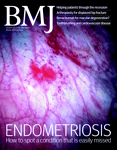 On 26 June this year, the British Medical Journal ran an article on endometriosis as part of their Easily missed series: a review of what it is, why it's missed, and how to diagnose it. Full credit to the authors, Samuel Engemise, Cerys Gordon, and Justin C Konje, for raising awareness in the medical profession. The full article is here, together with 'A Patient's Journey', Julie Harvey's story of her experiences.
On 26 June this year, the British Medical Journal ran an article on endometriosis as part of their Easily missed series: a review of what it is, why it's missed, and how to diagnose it. Full credit to the authors, Samuel Engemise, Cerys Gordon, and Justin C Konje, for raising awareness in the medical profession. The full article is here, together with 'A Patient's Journey', Julie Harvey's story of her experiences.Lucy Palmer wrote to the BMJ to contribute her own experiences and question what they said about painkillers. She wanted to write, she said, because, "I know how it feels to fear your own body and to, at times, know there is nothing you can do to stop or at least ease the pain. When you've been given all the medication you're allowed, and it still isn't enough, something has to change. The changes I feel are necessary aren't radical and they aren't unachievable; they're merely what needs to happen." She runs a blog on art, depression, and endometriosis, Pop goes the feasible, as well as a Facebook group, Endo Unite, to encourage people to raise awareness.
This is her experience, reproduced from the BMJ Rapid Response page:
 Dear Samuel Engemise, Cerys Gordon, and Justin C Konje,
Dear Samuel Engemise, Cerys Gordon, and Justin C Konje,I thank each of you so very much for your fascinating article about endometriosis being missed. To read those words from medical professionals gave me back some faith that was lost; some doctors do understand that endometriosis is a remarkably troubling, baffling and highly distressing disease to have to live with. From the age of 12, I have had to suffer agonising periods, fatigue, and depression. These symptoms have worsened in the 16 years since my periods started and I now have chronic pelvic pain and sharp, breathtakingly sharp pains around my right ovary, as well as depression lingering in the background.
I was diagnosed with extensive endometriosis in March 2010, and am now (end of September 2010) at the end of 6 months' treatment of GnRH agonists and HRT. I have felt terrible on too many of these days, with severe nausea, migraines, and oft-unbearable pelvic and ovary pain, along with the severe pain of post-operative recovery.
From a patient's perspective, dealing with almost constant pain, seeking help for it, and being told it is nothing to do with one's reproductive system but, perhaps, a bowel or problem is insulting, to say the least. Several women have expressed this opinion to me. We know our bodies, and we know the pain we feel. I have forgotten the amount of times I have been to see a doctor, of whatever level, about my "bad periods" and been stopped mid-sentence while trying to explain how and what I feel, or the times I have felt ignored and belittled by those meant to help me. This is not true for every doctor, I know; my GP is excellent and is the only one who believed in me, and that my pain was not, perhaps, psychological or a mere hormone imbalance.
The Royal College of Obstetricians and Gynaecologists states in its publication "The Investigation and Management of Endometriosis", released in October 2006:
"5.3 What is the 'gold standard' diagnostic test? For a definitive diagnosis of endometriosis, visual inspection of the pelvis at laparoscopy is the gold standard investigation, unless disease is visible in the posterior vaginal fornix or elsewhere."
It also states, "A normal scan does not rule out endometriosis." Indeed, not seeing something on an ultrasound does not mean it is not there. Again, several women and I have had countless ultrasound scans and been told all is normal. Perhaps it was not "normal", but simply unable to detect the endometriosis? For example, just 3 months before my laparoscopy, my pelvic cavity was apparently "normal" after an ultrasound scan, and yet on the day of my operation, endometriosis was found on the posterior uterine wall, and pelvic side wall, along with endometriomas in both ovaries. I don't believe that kind of damage occurs after 3 months.
In my opinion, using these methods to rule out endometriosis after it is simply not detected is a way of ensuring thousands of women and girls suffer perhaps not just pain, but untold internal damage, including depression. As said by Geraldine O'Sullivan-Hogan in reply to the article, "A Patient's Journey: Endometriosis" published 10th June 2010 in the British Medical Journal, some doctors are "confusing late diagnosis with late onset". That is certainly the way for so many women I have spoken to about their experiences, as well as me.
From first seeking help with my periods until a diagnosis that was (in my opinion) finally true and very, very late, there were 10 years. TEN long, painful years. I think endometriosis is underestimated and belittled in so many ways. It is assumed sometimes to be only "there" with periods, that the pain is actually manageable, or that a laparoscopy will cure endometriosis or that we want attention. We just want to be well. That is all.
According to Sobia Ashraf Sand - a doctor, "any pain killer will do", which was also in response to "A Patient's Journey: Endometriosis". This is a very unhelpful comment to make, I think. There are many painkillers that I, for example, can not take, as they clash with other medication I am on. There are also several I have tried which do not work any more, such is the tolerance built up in my system over years of taking them. Again, this is not unique to me.
I seek to ensure changes occur regarding diagnoses of endometriosis; I believe doctors and other medical staff ought to be more aware (if not already) of what it is, and that they ought to realise how gravely it can affect women, and girls, and their families.
So any people do not know what endometriosis is, or have even heard the word "endometriosis". For a health condition which affects roughly 2 million people in the United Kingdom, I think this is a damning reflection on the unwillingness of some people to publicise and talk about ovaries, vaginas, wombs, tubes, cervices and other women's bits and pieces. How are women and girls to know anything is wrong if they don't know that they ought to feel different, to feel "normal"? If they don't know what endometriosis is, why would they visit a related website? Information is not there, often, to help them find out there might be something that can be done to help them. This is one of the reasons I think all hospitals, clinics and GPs' surgeries should provide the excellent leaflets and posters from Endometriosis UK.
Endometriosis must not continue to be the "hidden" or "missed" disease it has been for so long.
Yours painfully,
Lucy Palmer
Share
Letter © Lucy Palmer 2010 and reproduced here by the author's permission







No comments:
Post a Comment